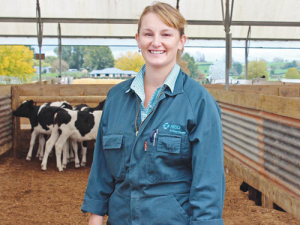Recycling 10,000 cow collars
MSD Animal Health New Zealand has partnered with Agrecovery in New Zealand’s first pilot to recycle SenseHub Dairy Collars (previously known as Allflex Collars) used by its dairy farmer clients.
 Vet Jo Houlter says money spent up front on a quality triple combination drench can save money later in terms of animal production.
Vet Jo Houlter says money spent up front on a quality triple combination drench can save money later in terms of animal production.
Farmers can no longer simply buy the cheapest drench, assume it is doing a good job of killing worms and not consider the longer term implications, says Jo Houlter, veterinary technical advisor, MSD Animal Health.
“Today, preventing and managing drench resistance and worm control must be a consideration in every animal health decision a farmer makes,” Houlter says. “Drench resistant worms are common and widespread in sheep and cattle in New Zealand and need to be actively managed.”
She says there are three main strategies for managing drench resistance on NZ farms:
- Minimising high-risk drenching and management practices
- Maintaining worm populations not exposed to drenching by the use of refugia
- Using combination drenches.
Combination drenches contain a mixture of different drench actives and worms resistant to one active ingredient will generally be killed by another.
“Field studies and modelling have shown the potential of combinations to slow the development of resistance,” Houlter say. “These studies all show that combinations have the greatest potential to slow drench resistance when they are used before resistance has developed in the farm worm population.”
She says that, by far, the best time to use combination drenches is when the actives are still effective on their own before worms have developed significant resistance.
“Saving the combination drenches until you need them is not the correct approach.”
She says triple active drenches are better than double actives, but are also more expensive. “This extra expense provides insurance against the possible future development of resistance and means that you are doing the best thing for your sheep, cattle and farm.”
Houlter says Alliance is a triple combination drench that includes levamisole, abamectin and oxfendazole, some of the best actives to control worms in sheep and cattle on NZ farms.
“Will a lesser, cheaper drench do the same job?” she asks. “Maybe but possibly not and you won’t know unless drench testing is carried out.”
Houlter says money spent up front on a quality triple combination drench can save money later in terms of animal production and the possible need to use even more expensive drenches or more drastic measures when drench resistance has developed on your property.
Alliance has been developed, proven and made in NZ for NZ livestock.
A New Zealand dairy industry leader believes the free trade deal announced with India delivers wins for the sector.
The Coalition Government will need the support of at least one opposition party to ratify the free trade deal with India.
Primary sector leaders have welcomed the announcement of a Free Trade Agreement between India and New Zealand.
At Pāmu’s Kepler Farm in Manapouri, mating has wrapped up at the across-breed Beef Progeny Test.
More than 150 people turned up at Parliament recently to celebrate the 20th anniversary of Horticulture New Zealand (HortNZ).
Biosecurity New Zealand says Kiwis should continue to keep an eye out for yellow-legged hornets (Vespa velutina) over the holiday season.

OPINION: The release of the Natural Environment Bill and Planning Bill to replace the Resource Management Act is a red-letter day…
OPINION: Federated Farmers has launched a new campaign, swapping ‘The Twelve Days of Christmas’ for ‘The Twelve Pests of Christmas’ to…